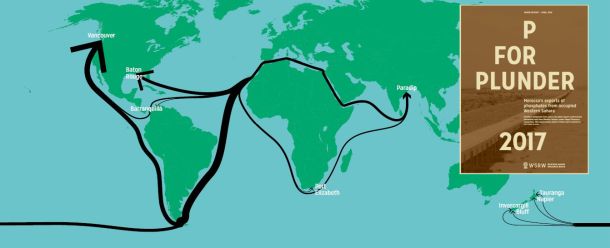
The UK company GeoEx is now trying to sell the seismic data it collected of the seafloor of occupied Western Sahara. WSRW warns possible clients to stay away.
Update, 20.04.2022: A Master thesis at the University of Houston studying geology offshore “Southern Morocco” (!) uses GeoEx data. All references to the geographical location of the study are incorrect.
In 2017, the UK company GeoEx carried out massive seismic exploration offshore occupied Western Sahara. The study was last year reported on by Western Sahara Resource Watch.
In the past few months, the company has stepped up its sales initiatives of the controversial data set.
The study is comprised of 14,986 kilometers of seismic data offshore Morocco and Western Sahara combined, collected during the second half of 2017. The maps published on GeoEx’s website [or download], suggest that an estimated 40% of the total study, or approximately 5800 kilometers, was carried out offshore Western Sahara.
However, on its website and in its external marketing, GeoEx consistently states that the data has been collected in “Morocco”.
No State in the world, nor the UN or the Court of Justice of the EU, recognise Western Sahara as part of Morocco's national territory. No reference whatsoever is made on GeoEx’s website informing that a large part of the “Moroccan” data was in fact not collected in Moroccan waters at all, but in occupied territory.
Western Sahara was illegally and brutally occupied by Morocco in 1975. In recent years, the people of the territory have taken legal steps to defend their legitimate rights to their own resources.
For the interpretation and mapping of the data, GeoEx has teamed up with two other UK companies: Subsurface Resource Consulting (SRC) and Bridgeporth Limited. SRC explains on its website that it is marketing a “new Seismic Atlas offshore Morocco” it has prepared “on behalf of GeoEx”. SRC is a “specialist upstream oil and gas consultancy” providing “a wide range of technical geoscience, engineering and advisory services”.
In a SRC flyer [or download] on the dataset, made in April 2019, a large chunk of Figure 1 – the SSW part of the figure, to the left – is collected in Western Sahara. The flyer stated that the “Seismic Atlas is anticipated to be completed by end July 2019”. The GeoEx website states that “interpretation atlas” will be available from the third quarter of 2019.
Western Sahara Resource Watch condemns the involved companies for marketing oil opportunities in Western Sahara while the territory remains under Moroccan occupation.
“These companies have never obtained the permission from the people of Western Sahara to carry out or analyse the geology of their territory. Partnering with the occupying power in this endeavour undermines the UN peace efforts. Morocco has no right to commission GeoEx nor any other company to collect data and sign oil licenses offshore Western Sahara”, Sylvia Valentin, chair of Western Sahara Resource Watch stated.
“Clients deciding to engage in oil exploration in the occupied territory, will surely be confronted with protests from the owners of that seafloor, namely the Western Sahara people. We call on the involved companies to respect international law and support the UN peace process by not selling data from Western Sahara. We also call on possible clients to read up on the UN peace efforts in the territory, on Morocco’s human rights violations in the territory, and on the rulings against international trade arrangements covering the territory”, Valentin said.
The controversial sales was marketed in a magazine [or download] in June 2019, in a piece written by a Steve Lawrence. Numerous references are made to Kosmos Energy’s so-called BC-1 well from 2015. The drilling operation caused widespread condemnation from the Saharawis.
In what appears to be a status report for the activities of 2018, ONHYM stated that it had “organized in collaboration with Geoex a door-to-door campaign in London and Houston to promote the Multiclient seismic survey acquired in the Atlantic Offshore” [or download].
GeoEx had contracted the company BGP to carry out the seismic studies, which took place in violation of international law. The United Nations stated in 2002 that any further oil exploration in Western Sahara would be illegal unless the people of the territory had given its consent. The same principle was the corner stone element of the three decisions by the EU Court of Justice from 2016 and 2018 regarding the EU's bilateral agreements with Morocco covering the Non-Self-Governing Territory.
Large Russian-Chinese-British oil study in Western Sahara
With all multinational oil companies in occupied Western Sahara having abandoned their activities, the Moroccan government is trying to catch interest of new investors for further illegal oil exploration. Russian and Chinese state-owned companies, commissioned by a UK firm, are behind a large exploration programme.
New report: Western Sahara phosphate trade halved
The export of phosphate rock from occupied Western Sahara has never been lower than in 2019. This is revealed in the new WSRW report P for Plunder, published today.
New report on Western Sahara phosphate industry out now
Morocco shipped 1.93 million tonnes of phosphate out of occupied Western Sahara in 2018, worth an estimated $164 million, new report shows. Here is all you need to know about the volume, values, vessels and clients.
New report on contentious Western Sahara phosphate trade
Morocco shipped over 1.5 million tonnes of phosphate out of occupied Western Sahara in 2017, to the tune of over $142 million. But the number of international importers of the contentious conflict mineral is waning, WSRW's annual report shows.



